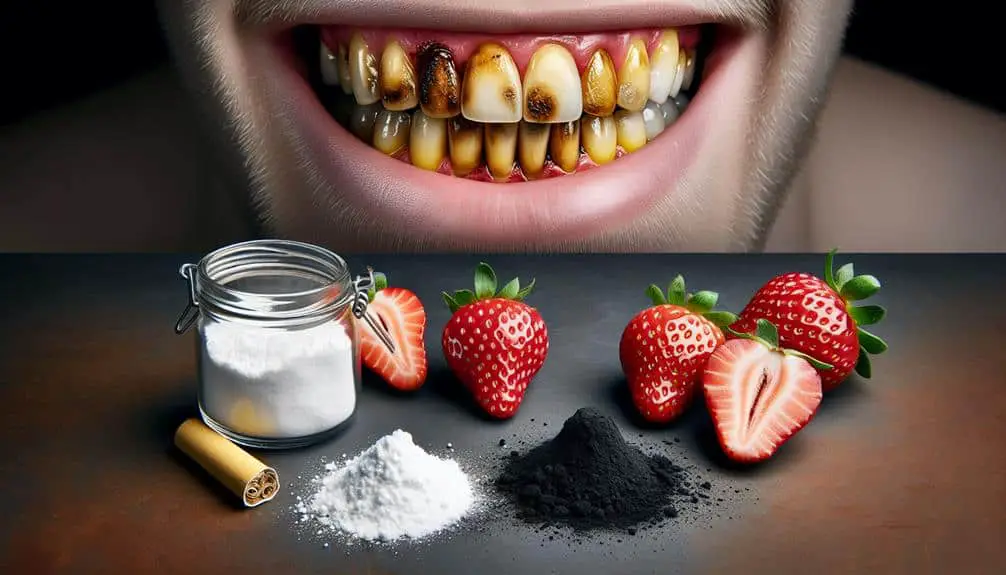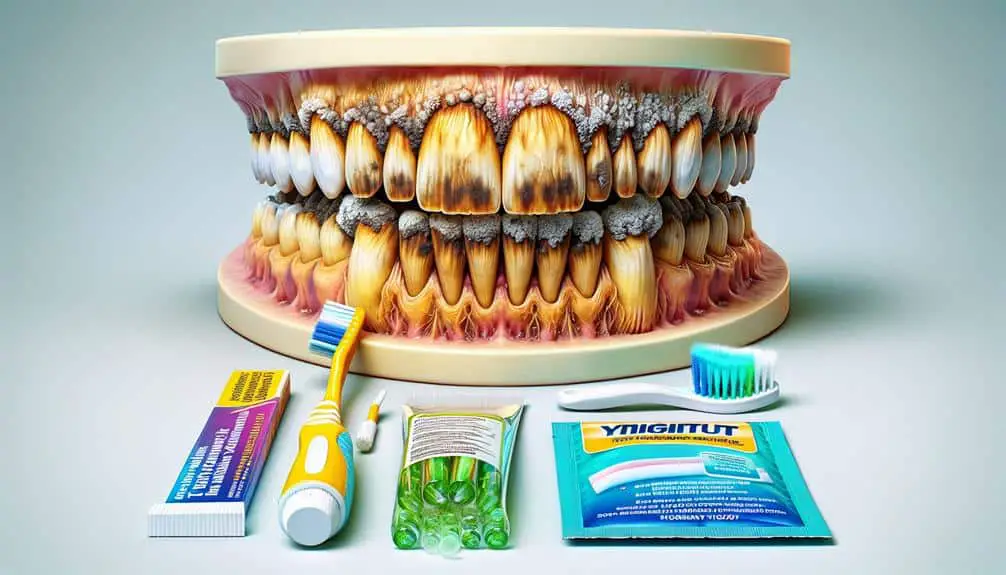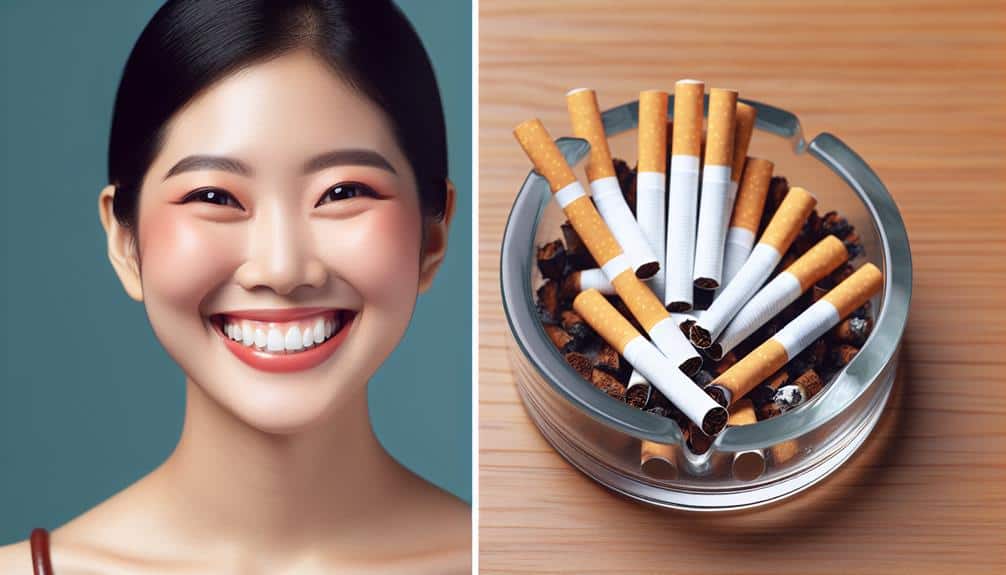To brighten your yellow smoker's teeth naturally, consider trying these evidence-based remedies: oil pulling to remove bacteria and stains, baking soda for gentle abrasion, apple cider vinegar for teeth whitening, lemon juice for its natural bleaching properties, strawberries to break down plaque, activated charcoal for effective stain removal, turmeric paste for combating yellow stains, coconut oil for improved oral hygiene, orange peel for natural whitening, and hydrogen peroxide with caution for safety. These remedies can help rejuvenate your smile and boost oral health.
Key Points
- Oil pulling removes bacteria and stains, improving oral health.
- Baking soda whitens teeth gently and freshens breath.
- Apple cider vinegar can whiten teeth over time with consistent use.
- Lemon juice's citric acid breaks down stains for a brighter smile.
- Activated charcoal effectively combats yellow stains from smoking.
Oil Pulling
To improve your yellow smoker's teeth, consider incorporating oil pulling into your oral hygiene routine. Oil pulling is an ancient practice that involves swishing oil around in your mouth to remove bacteria, debris, and stains. This method is believed to have various health benefits, including improved oral health and fresher breath. Scientific evidence supporting the effectiveness of oil pulling is limited but promising, with some studies suggesting it can reduce plaque and gingivitis.
Many individuals have reported positive user experiences with oil pulling, noting whiter teeth and healthier gums. Before and after photos shared by some users also demonstrate noticeable improvements in tooth color and overall oral hygiene. While oil pulling may not be a substitute for professional dental care, it can be a beneficial addition to your daily routine. Consider using coconut, sesame, or sunflower oil for oil pulling and be sure to swish the oil around your mouth for about 15-20 minutes before spitting it out.
Baking Soda
If you're looking for a natural remedy to combat yellow smoker's teeth, baking soda might be the solution for you. This household staple is celebrated for its teeth-whitening properties and has been used for decades in oral care.
Understanding the benefits, proper application techniques, and necessary safety precautions are key to effectively utilizing baking soda for teeth whitening.
Baking Soda Benefits
Using baking soda can effectively help in whitening yellow smoker's teeth. Baking soda, also known as sodium bicarbonate, is a gentle abrasive that can remove surface stains on teeth. Its natural whitening properties make it a popular ingredient in many toothpaste and teeth whitening products.
When used correctly, baking soda can help to break down stains caused by smoking and other factors, revealing a brighter smile. Its alkaline nature also helps neutralize acids in the mouth, reducing the risk of tooth decay and gum disease.
Additionally, baking soda can freshen breath by eliminating odor-causing bacteria. Incorporating baking soda into your oral care routine can be a cost-effective and natural way to improve the appearance of yellow smoker's teeth.
Application Techniques
For optimal results when applying baking soda to whiten yellow smoker's teeth, make sure thorough but gentle brushing motions are used to effectively remove surface stains. Here are some key techniques to maximize the benefits of using baking soda:
- Toothbrush Techniques: Use a soft-bristled toothbrush and apply a small amount of baking soda paste.
- DIY Mouthwash: Rinse your mouth with a mixture of water and baking soda after brushing to neutralize acids.
- Tongue Scraping: Don't forget to gently scrape your tongue to remove bacteria and residue.
- Flossing Tips: Floss regularly to ensure all areas between teeth are clean and free of plaque buildup.
Safety Precautions
When using baking soda for teeth whitening, it's important to take safety precautions to avoid any potential harm to your dental health. Proper dental hygiene practices are essential to prevent damage to your teeth and gums.
Before using baking soda, consult with your dentist to make sure it's appropriate for your oral health. While baking soda can be effective in removing stains, excessive use can wear down tooth enamel, leading to sensitivity and other issues.
To minimize risks, mix baking soda with water to create a paste, and gently brush your teeth with it for no more than two minutes. Additionally, limit the frequency of baking soda applications to once or twice a week to maintain oral health.
Apple Cider Vinegar
To help combat yellow smoker's teeth naturally, consider incorporating apple cider vinegar into your oral care routine. Apple cider vinegar has gained popularity for its potential benefits in dental health, including teeth whitening.
Here are some ways you can use apple cider vinegar for your yellow smoker's teeth:
- Vinegar rinse: Create a solution of apple cider vinegar and water (diluted in equal parts) to use as a mouthwash. Swish it around in your mouth for about 30 seconds and then rinse thoroughly with water.
- Whitening paste: Mix apple cider vinegar with baking soda to form a paste. Brush your teeth with this paste for 1-2 minutes before rinsing thoroughly.
- Morning ritual: Start your day by gargling with a mixture of apple cider vinegar and water to help remove stains and freshen your breath.
- Consistency is key: Incorporate apple cider vinegar into your oral care routine consistently to see potential improvements in teeth color over time.
Lemon Juice
Consider incorporating lemon juice into your oral care routine as a natural remedy for yellow smoker's teeth. Lemon juice contains citric acid, which can help break down stains on teeth and brighten your smile. However, it's crucial to be mindful of both the benefits and potential health risks associated with using lemon juice.
One of the main advantages of using lemon juice is its natural bleaching properties. The citric acid in lemon juice can help remove surface stains on teeth, making them appear whiter. Additionally, lemon juice has antibacterial properties that may help combat bacteria in the mouth, contributing to better oral health.
Despite its benefits, lemon juice should be used cautiously due to its high acidity. Prolonged exposure to acidic substances like lemon juice can erode tooth enamel, leading to sensitivity and other dental issues. If you decide to use lemon juice as a teeth-whitening remedy, consider diluting it with water and using it sparingly to minimize the risk of enamel damage.
When comparing lemon juice to other natural remedies like apple cider vinegar, lemon juice may be a gentler option due to its lower acidity level. However, individual results may vary, so it's crucial to find the most suitable remedy for your needs while considering the potential risks involved.
Strawberries
You can harness the berry whitening power of strawberries to help combat yellow smoker's teeth.
Strawberries contain malic acid, which can act as a natural astringent to help remove surface stains on your teeth.
Berry Whitening Power
Strawberries possess potent whitening properties that can help combat yellow stains on smoker's teeth. Here are some reasons why you should consider incorporating strawberries into your oral care routine:
- Vitamin C: Strawberries are rich in vitamin C, which can help break down plaque that causes discoloration.
- Malic Acid: This natural ingredient found in strawberries aids in removing surface stains on teeth.
- Ellagitannins: These compounds present in strawberries can reduce stain-attracting bacteria in the mouth.
- Antioxidants: The antioxidants in strawberries help protect against oral diseases, promoting overall dental health.
DIY Strawberry Paste
Harnessing the whitening power of strawberries effectively, creating a DIY paste at home can be a simple and cost-effective solution for combating yellow smoker's teeth. Strawberries contain malic acid, which can help remove surface stains on teeth, making them appear whiter.
To make a DIY strawberry paste, mash up a ripe strawberry and mix it with baking soda to create a paste. Gently brush this mixture onto your teeth, leave it on for a few minutes, then rinse thoroughly. The natural bleaching properties of strawberries, combined with the abrasive texture of baking soda, can help polish away stains and brighten your smile.
Activated Charcoal
Activated charcoal has been studied for its potential to help reduce stains on teeth caused by smoking. Here are some key points about using activated charcoal for teeth whitening:
- Effective Stain Removal: Activated charcoal has adsorbent properties that can bind to stains and toxins, aiding in their removal from the surface of your teeth.
- Natural Whitening: It's a natural and chemical-free way to whiten teeth, making it a popular choice for those seeking natural remedies.
- Freshens Breath: Activated charcoal can also help freshen breath by eliminating odor-causing bacteria from the mouth.
- Caution with Frequency: While using activated charcoal occasionally can help whiten teeth, excessive use may wear down tooth enamel, therefore, incorporating it in moderation is crucial.
Incorporating activated charcoal into your oral care routine, such as using charcoal toothpaste or an activated charcoal toothbrush, can be a beneficial addition to help combat yellow stains on your teeth caused by smoking.
Turmeric Paste
Consider incorporating turmeric paste into your oral care routine as a natural remedy to combat yellow stains on your teeth caused by smoking. Turmeric, known for its numerous health benefits, can also aid in teeth whitening due to its anti-inflammatory and antimicrobial properties. When used as a paste, turmeric can help reduce the appearance of yellow discoloration on teeth by gently removing surface stains.
Turmeric paste, a simple mix of turmeric powder and water, can be applied directly to the teeth or used as a toothpaste alternative. The curcumin compound present in turmeric is responsible for its teeth-whitening effects. Research suggests that curcumin can inhibit the growth of bacteria in the mouth, which may contribute to discoloration.
To create a turmeric paste, combine a small amount of turmeric powder with water to form a thick consistency. Apply the paste to your toothbrush or directly onto your teeth, gently brushing for 2-3 minutes before rinsing thoroughly. Incorporating turmeric paste into your oral hygiene routine may help combat yellow smoker's teeth effectively and naturally.
Coconut Oil
Coconut oil is known for its numerous health benefits, including potential teeth-whitening properties.
To use coconut oil for improving yellow smoker's teeth, consider oil pulling or using it as a natural toothpaste.
Research suggests that coconut oil may be effective in reducing plaque and improving overall oral health.
Benefits of Coconut Oil
One effective natural remedy for improving the appearance of yellow smoker's teeth is harnessing the beneficial properties of coconut oil. Coconut oil offers various benefits that can contribute to enhancing oral health, particularly in addressing teeth discoloration.
Here are some key advantages of using coconut oil for oral care:
- Antibacterial Properties: Coconut oil contains lauric acid, which has antibacterial properties that may help reduce harmful bacteria in the mouth.
- Anti-Inflammatory Effects: The anti-inflammatory properties of coconut oil can assist in soothing gum inflammation and promoting healthier gums.
- Teeth Whitening: Regular use of coconut oil through oil pulling can help whiten teeth by reducing plaque buildup.
- Improved Oral Hygiene: Coconut oil can aid in maintaining good oral hygiene by combating bad breath and promoting overall mouth health.
How to Use
To effectively utilize coconut oil for improving the appearance of yellow smoker's teeth, begin by incorporating it into your daily oral care routine through a simple method known as oil pulling. Oil pulling is a traditional practice that involves swishing coconut oil around in your mouth for about 15-20 minutes. This process helps to remove bacteria, plaque, and stains from your teeth, promoting oral hygiene and potentially reducing yellow discoloration.
To try this DIY solution, take a tablespoon of coconut oil, swish it around in your mouth, and then spit it out. Follow this by brushing your teeth as usual. This natural alternative can be a gentle yet effective way to enhance the whiteness of your teeth over time.
Effectiveness and Results
For peak effectiveness and noticeable results when using coconut oil to combat yellow smoker's teeth, consistency in incorporating oil pulling into your daily oral care routine is key. Here are some important points to take into account:
- Long term effects: Regular use of coconut oil for oil pulling can lead to gradual but sustainable improvements in teeth whiteness over time.
- Patient satisfaction: Many individuals report high levels of satisfaction with the results achieved through coconut oil pulling.
- Comparison with professional treatments: While professional treatments may offer quicker results, coconut oil pulling provides a natural and gentler alternative.
- Cost effectiveness: Coconut oil is an affordable option compared to professional whitening treatments, making it a budget-friendly choice for maintaining oral health and combating yellow smoker's teeth.
Orange Peel
How can orange peel help in naturally whitening yellow smoker's teeth?
Orange peel contains natural whitening properties that can be beneficial in brightening stained teeth caused by smoking. The peel is rich in vitamin C, calcium, and other compounds that can help combat discoloration and promote healthier teeth and gums.
One of the primary benefits of using orange peel for teeth whitening is its critical abrasiveness. The gentle abrasion from rubbing the inner part of the orange peel against your teeth can help remove surface stains without causing damage to the enamel. Additionally, the vitamin C in orange peel can help reduce the growth of bacteria in the mouth, which can contribute to discoloration and bad breath.
To utilize orange peel for whitening your teeth, simply rub the inner side of the peel against your teeth for a few minutes, then rinse your mouth thoroughly. While orange peel can be a useful natural remedy, keep in mind that consistent oral hygiene practices and professional dental cleanings are also vital for maintaining a healthy, bright smile.
Hydrogen Peroxide
Hydrogen peroxide is a common household product that has been used as a teeth-whitening agent due to its bleaching properties. When considering using hydrogen peroxide for teeth whitening, it's vital to be aware of the following:
- Safety First: While hydrogen peroxide can be effective in whitening teeth, it's important to use it in the correct concentration to avoid any potential harm to your oral tissues.
- Consult a Professional: Before using hydrogen peroxide for teeth whitening, it's recommended to consult with your dentist to make sure it's safe for your specific oral health needs.
- Duration Matters: Using hydrogen peroxide excessively or for prolonged periods can lead to tooth sensitivity and irritation of the gums.
- Myth Busting: Despite common beliefs, hydrogen peroxide shouldn't be used undiluted directly on the teeth as it can cause harm to the enamel and soft tissues in the mouth.
Understanding the risks and myths associated with hydrogen peroxide can help you make informed decisions when exploring natural remedies for yellow smoker's teeth.
Frequently Asked Questions
Can These Natural Remedies Be Harmful to the Enamel on My Teeth?
Utilizing natural ingredients for teeth whitening can be safe for enamel protection if used correctly. However, some remedies may cause tooth sensitivity. Maintaining a balance between natural remedies and oral health care is crucial to prevent enamel damage.
How Long Does It Take to See Noticeable Results From Using These Remedies?
You may start noticing small improvements within a few weeks of consistent use. Immediate changes, like whitening strips, might not occur, but long-term commitment to these remedies can lead to significant results over time.
Are There Any Specific Precautions I Should Take When Using These Remedies?
When employing natural remedies for yellow smoker's teeth, it is crucial to take precautionary measures. Always adhere to suggested dosages and application instructions. Be mindful of potential side effects such as tooth sensitivity or gum irritation. Seek advice from a dentist if needed.
Can These Remedies Help With Other Oral Health Issues Besides Yellowing Teeth?
Lemon water and baking soda can freshen breath and strengthen gums. These remedies support oral hygiene, preventing stains. Incorporating them into your routine can help maintain gum health and fight bad breath, promoting overall oral wellness.
Are There Any Natural Remedies That Should Be Avoided for Yellow Smoker's Teeth?
When looking to whiten yellow smoker's teeth naturally, avoid harsh remedies like lemon juice or baking soda. These can erode enamel. Opt for safer options like coconut oil pulling or activated charcoal for effective teeth whitening and improved oral health.
Conclusion
Overall, these natural remedies offer a safe and effective way to combat yellow smoker's teeth. Did you know that according to a study published in the Journal of Indian Society of Periodontology, oil pulling with coconut oil can notably reduce plaque and improve overall oral health?
Incorporating these remedies into your dental care routine can help restore your smile and boost your confidence. Give them a try and see the difference for yourself!



